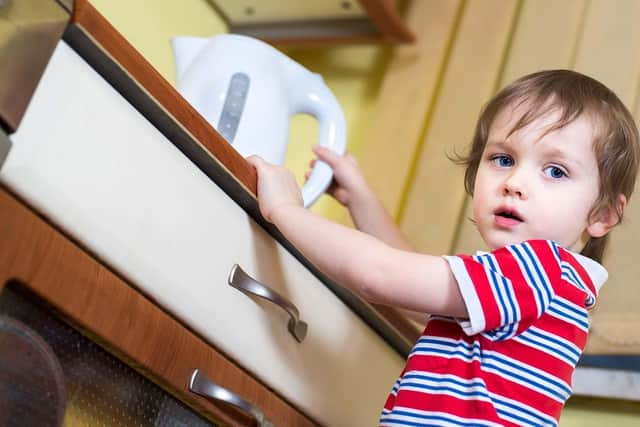Safety made simple ahead of Child Safety Week (June 5-11)
and live on Freeview channel 276
During Child Safety Week (June 5-11) the Public Health Agency (PHA) is raising awareness of accidents that can happen in the home and providing tips on how best to help prevent them.
Janine Gaston, the PHA’s regional lead on home accident prevention, said: "In Northern Ireland in a typical week, two people die as a result of home accidents. In addition to these deaths, there are approximately 17,000 admissions to hospital each year as a result of unintentional injuries.
Advertisement
Hide AdAdvertisement
Hide Ad“We also know that home accidents are the biggest cause of death and serious injury in children under five. Data highlights that five main causes account for 90% of unintentional hospital admissions for this age group and are a significant cause of preventable death and serious long term harm: choking, suffocation and strangulation, falls, poisonings, burns and scalds and drowning.


“Internal window blind cords and chains can also pose a risk to babies, small children and vulnerable people who could injure or even strangle themselves on looped operating cords and chains.
“Accidents often occur when we’re distracted and can happen alarmingly quickly, so it is important that we don’t ignore the risks and instead put in place some simple steps to reduce the likelihood of them occurring.
“It is impossible to watch over our children 24 hours a day, so we must take steps to make the home environment as safe as possible – by incorporating small changes into your routine, accident prevention will become a habit without having to think about it.”
Helpful tips:
Advertisement
Hide AdAdvertisement
Hide AdExamine every blind in your home. If they have a looped control chain or cord and do not have a safety device fitted, then you can easily install one of the many devices available;
Ensure that all operating blind cords and chains cannot be reached by children;
Move cots, beds and any furniture away from windows and blinds – remember children love to climb;
Check that televisions, chests of drawers and shelving units are securely anchored to the wall as bulky, heavy furniture can seriously injure or even kill a small child if it falls on top of them;
Advertisement
Hide AdAdvertisement
Hide AdPut small toys and button batteries that could cause choking or be potentially fatal if swallowed out of the reach of children;
Ensure food is cut up into small pieces;
Ensure items such as nappy sacks etc that could cause choking and /or suffocation are put away out of reach of children;
When cleaning out kitchen cupboards and cabinets it is also important to put household cleaners and medicines away to avoid accidental poisoning or chemical burns. Make sure they are out of the sight and reach of children in a locked or high-level cupboard and clean up any spills;
Secure any loose-fitting rugs to avoid trips and falls;
Be mindful of dangers associated with hot appliances or with hot liquids to prevent burns and scalds;
Test smoke alarms and carbon monoxide detectors;
Advertisement
Hide AdAdvertisement
Hide AdAlways supervise children, especially when power tools and lawnmowers are being used, and tidy up all equipment straight after the job is done;
Always supervise children when they are playing in the garden, on trampolines and climbing frames, and be aware of the dangers associated with open ponds and pools.
The PHA commissions all 11 local councils in NI to provide the Home Safety Check Scheme.
This scheme offers free home safety checks to families with children under five, people aged over 65 and those who are vulnerable.
Advertisement
Hide AdAdvertisement
Hide AdThe check offers guidance on all aspects of home safety, as well as free safety equipment (equipment subject to a home assessment, eligibility and availability).
For contact details of councils in Northern Ireland click here.
Child Safety Week is the Child Accident Prevention Trust’s (CAPT) annual community education campaign, acting as a catalyst for thousands of safety conversations and activities UK-wide.
You can visit the Child Accident Prevention Trust website at capt.org.uk.